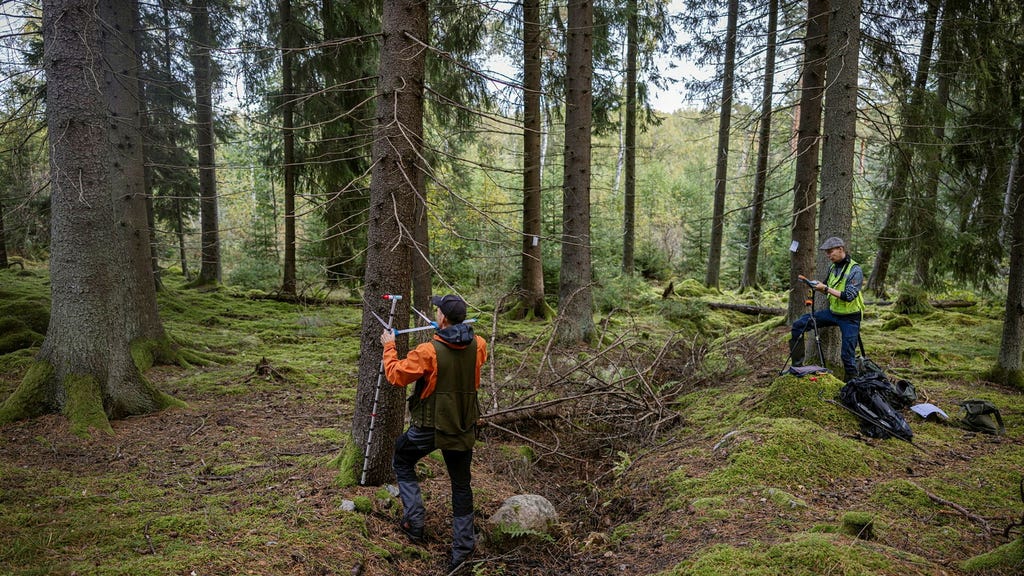The Swedish government is grappling with a complex dilemma in its climate policy. Dwindling forest growth threatens Sweden’s compliance with EU climate regulations, potentially forcing the government to implement measures that could increase fuel prices. Climate Minister Romina Pourmokhtari has previously deferred to the parliamentary Environmental Objectives Committee, which is tasked with presenting proposals on the issue next year, but the committee’s work is currently mired in conflict. Concurrently, the government has been quietly pursuing another avenue to resolve this predicament. Together with Finland, which faces a similar challenge, Sweden is engaging in negotiations with the European Commission, seeking a more lenient interpretation of the EU’s forest-related climate requirements, known as LULUCF (Land Use, Land Use Change and Forestry).
These regulations stipulate that substantial amounts of carbon dioxide must be absorbed by vegetation in forests and land to achieve the EU’s overarching goal of net-zero emissions by 2050. The LULUCF regulations are divided into two periods: 2021-2025 and 2026-2030. For the first period, net carbon uptake from managed forests must not fall below a nation’s forest reference level, based on forest management practices between 2000 and 2009. By 2030, Sweden needs to increase its carbon sequestration in forests and land to 49 million tons annually. However, the net uptake in 2022 was only 39 million tons. A review in 2027 will assess compliance for the 2021-2025 period. Any shortfall will directly reduce the permissible emissions from the transport sector.
Internal government documents reveal Sweden’s concern that countries with significant forest cover are at high risk of missing their targets under the current regulations. Failure to meet these targets would have substantial consequences. The primary issue is the sharp decline in Swedish forest growth, attributed partly to the 2018 drought and spruce bark beetle infestations. Notably, the government’s communication to the EU Commission omits the contribution of increased logging to the reduced carbon sequestration capacity of forests. Sweden urges the Commission to adopt realistic expectations regarding the forest sector’s contribution to EU climate efforts, emphasizing the importance of reducing fossil fuel emissions over relying on short-term, uncertain carbon sinks in forests.
This stance contradicts the EU’s scientific advice, which highlights the need for a significant increase in carbon sequestration in forests and land to achieve the Union’s climate goals. Critics, such as climate analyst Magnus Nilsson, argue that Sweden’s approach jeopardizes the EU’s overall climate efforts, potentially undermining the EU’s commitment under the Paris Agreement and, consequently, the global climate policy framework. Minister Pourmokhtari clarifies that the discussions with the Commission are not about reducing Sweden’s requirements but rather about ensuring a correct, clear, and implementable interpretation of the existing LULUCF regulations and flexibilities. Sweden wants the regulations to acknowledge uncertainties stemming from natural factors like temperature, precipitation, and disturbances such as drought, storms, fires, and insect infestations, as well as accounting uncertainties.
While seemingly minor, these ”accounting uncertainties” could significantly impact Sweden’s climate policy by 2030. Finland’s recent experience illustrates the potential magnitude of these adjustments. A revision of Finland’s methodology for measuring greenhouse gas absorption by forests resulted in a 40-million-ton increase in the country’s emission allowance until 2030 – nearly equivalent to Sweden’s total annual emissions. This drastic change stemmed primarily from a reassessment of wetland emissions, which were found to be releasing rather than absorbing greenhouse gases. Paradoxically, this discovery led to a decrease in Finland’s forest-related climate requirements due to the regulations’ reliance on historical carbon storage levels.
A similar recalculation in Sweden could dramatically alter the country’s prospects for meeting its climate targets, either positively or negatively. Swedish authorities, including the Swedish University of Agricultural Sciences (SLU), the Swedish Environmental Protection Agency, and the Swedish Forest Agency, have been tasked with proposing adjustments to the Swedish reference level. While the EU Commission and its scientific advisors have declined to comment on these sensitive ongoing negotiations, the outcome will significantly impact Sweden’s climate policy and potentially the price of fuel for its citizens. The interplay between national interests, EU regulations, and scientific realities underscores the complexity of tackling climate change within a multinational framework.














